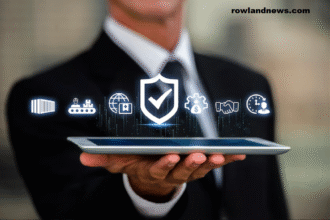Introduction
A New Weapon Against an Old Foe
Imagine you stride into an outlet, energized to obtain a designer handbag that’s been on your wish list. The cost looks too good to be true, and sadly, it is. You’ve just acquired a persuasive counterfeit. Now, envision yourself as the retailer, combating chargeback deception, stock tampering, and shady suppliers. Deception is draining the commercial sector billions of dollars annually.
But what if there were a way to make each transaction, each shipment, and each provider 100% transparent?
Enter blockchain, the groundbreaking engineering originally crafted for cryptocurrency that’s now revolutionizing retail scam prevention.
What is Blockchain
To understand blockchain’s function in retail, it is helpful to grasp what it is, without the buzzwords.
At its core, blockchain is a decentralized digital ledger. Think of it as a digital notebook shared throughout thousands of computers. Once advice is recorded (for a sale, shipment, or return), it’s timestamped, encrypted, and immutable. This means no one can go back and alter the records without leaving a trace.
This transparency and traceability make blockchain an ideal tool for stopping deception before it starts.
Why Retail Fraud Is a Growing Problem
Deception in retail isn’t just about phony coupons or stolen credit cards anymore. The landscape is far more intricate. Here are just a few of the most common types:
- Supply chain fraud: Tampered or counterfeit items making their way into genuine inventory.
- Return fraud: Customers returning used or stolen items for full refunds.
- Digital payment fraud: Stolen identities used for online purchases.
- Chargeback fraud: Customers falsely claiming they never received a product.
According to a report from the National Retail Federation, retailers lost a staggering sum of over $100 billion to deception in the single year of 2023. Clearly, something needs to change.
How Blockchain Fights Retail Fraud
Supply Chain Visibility
One of blockchain’s most potent applications in retail is bringing lucidity to the supply chain.
With blockchain, every step of a product’s journey—from the initial materials to the store shelf- is chronicled and traceable. This allows retailers, and customers too, to confirm where the product originated, who handled it, and if it was tampered with along the way.
Luxury brand LVMH now leverages blockchain through a platform called the Aura Blockchain Consortium to authenticate the legitimacy of its high-end products. Shoppers can scan a code to trace their purchase back to its roots, proving its authenticity.
Fraud-Proof Payments
Blockchain-based payment systems, such as cryptocurrencies or stablecoins, add a layer of protection against deception.
These models:
- Reduce chargeback fraud (transactions cannot be reversed)
- Provide complete transparency of exchanges
- Eliminate intermediaries where manipulation could potentially occur
Now, the central e-commerce platform Shopify supports cryptocurrency payments through providers like Coinbase and BitPay, helping to reduce fraudulent disputes and giving merchants more control.
Smart Contracts for Returns and Refunds
Smart contracts, self-executing programs stored on the distributed ledger, can automatically approve or deny returns subject to pre-agreed terms.
Imagine a world where:
- A return is only permitted if the proper item is sent back
- Reimbursements are processed instantly when all criteria are satisfied
- No space remains for trickery or manipulation
Blockchain startups like Provenance are already bringing this vision to life.
Read Also: Blockchain for Securing Intellectual Property and Digital Assets
Benefits for Retailers and Shoppers Alike
Implementing blockchain solutions isn’t just about ending deception. It also offers additional advantages:
✅ Builds trust with customers
✅ Enhances inventory accuracy
✅ Simplifies regulatory compliance
✅ Improves recall management
✅ Adds brand value through transparency
As consumers demand more transparency in their shopping experiences, blockchain technology is emerging as a powerful branding tool for retailers. It allows them to demonstrate their commitment to ethics and security to an increasingly savvy customer base.
Challenges to Blockchain Retail Adoption
Blockchain certainly isn’t a perfect solution for all challenges. Significant hurdles still exist, such as:
- High costs of implementation for smaller businesses
- Difficulties integrating new systems with old infrastructures
- Ongoing regulatory uncertainty
- Need for education around blockchain use cases
Regulators worldwide continue to work on developing sensible policies surrounding this novel technology. Furthermore, both staff and shoppers require education on how distributed ledgers function and the benefits they offer.
Despite these very real obstacles, momentum is building as solutions become more affordable and use cases more numerous. Major corporations already view digital assets and blockchain as strategically crucial to their long-term planning.
As demonstrated in a recent Deloitte Global Blockchain Survey, over three-quarters of global executives surveyed believe that these technologies will substantially impact their sector within the next three years.
The Road Ahead: Toward Fraud-Free Retail
While blockchain may not single-handedly eliminate retail fraud overnight, it is undeniably pushing the industry toward greater accountability.
Imagine if customers could instantly validate details about any item:
- Where it originated
- Who made it
- Whether it is genuine
Retailers would also benefit, losing far fewer revenues to deception, such as fabricated returns or unsubstantiated deliveries. This is the type of transparency blockchain may facilitate.
As deception evolves in sophistication, defensive strategies must modernize in turn. Whether a large multinational or local mom-and-pop operation, exploring how decentralized networks could translate to fewer losses, amplified trust, and tighter relationships may give wiser businesses an advantage moving forward.
Starting a conversation with a blockchain consultant or independent researcher offers a low-commitment first step.
Resources:














